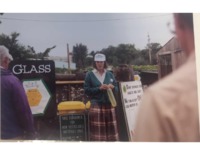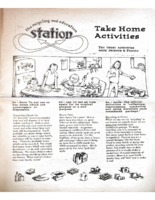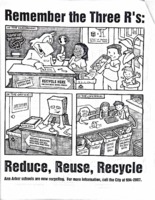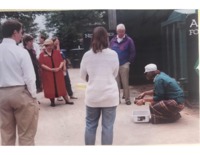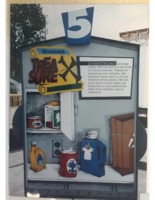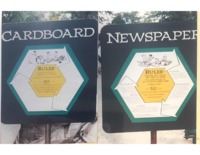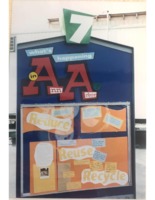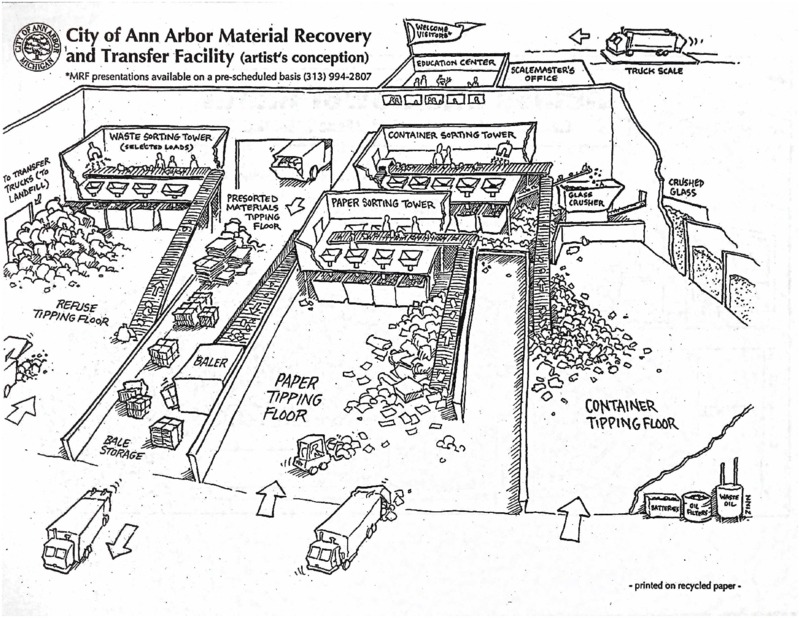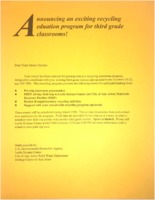See a related article from the Ecology Center's website, Connecting Learning with Action: the Ecology Center’s Recycling Education Program
New Facilities for Recycling Education
Environmental education was on the move in the 1990s, thanks to the Ecology Center’s mobile groundwater education program, GEE-WOW!, and other long-standing partnerships with facilities such as the Leslie Science Center. To encourage new perspectives on recycling education, the EC leaned on the strong relationships it had cultivated with Ann Arbor Public Schools to draw students and teachers to their recycling facilities. Two key developments in the 1990s--the Recycling & Education Station (RES), and the Materials Recovery Facility (MRF)--ensured the Ecology Center remained committed to “hands-on” and “minds-on” education.
Recycling & Education Station
Opening on September 12, 1991, the Recycling & Education Station was the vision of Claire Pferdner, the Drop-off Station Recycling Education Coordinator. Expanding on the Drop-off Station’s facilities, the RES would be a kid- and family-friendly extension that allowed visitors of all ages to experience the ins and outs of recycling first-hand. Additionally, Pferdner obtained a grant from the Protecting Michigan’s Future Bond Program, as well as funding from the city of Ann Arbor’s Solid Waste Department.
Pferdner’s design was primarily informational. She conceptualized eight large, visually appealing posterboards that would guide visitors through an outer area at the Drop-off Station, before leading them to more hands-on activities within the facility itself. The topics for these boards are
- Introduction - We have a big garbage problem.
- Where is the garbage going?
- We can deal with the garbage problem.
- Reducing, reusing, recycling: it’s easy!
- The world’s resources are hidden in your home.
- I make a difference!
- What’s happening in Ann Arbor?
- We are the solution!
Additionally, Pferdner developed information boards about the seven types of materials collected at the Drop-off Station: glass containers, tin cans, aluminum food packaging, plastic containers, newsprint, cardboard and brown paper bags, and office paper. As the images below indicate, the Recycling & Education Station quickly became an informative and popular location for the Ecology Center’s solid waste education efforts.
Materials Recovery Facility
Four years after the RES opened its doors, the city of Ann Arbor debuted another recycling-related location: the Materials Recovery Facility (MRF). Developed as part of a ballot effort known as the Environmental Bond of 1990, the MRF accepted mixed recyclables, no longer requiring the pre-collection source separation that was needed for Recycle Ann Arbor’s operations. The MRF was a huge factor in improving RAA’s stability [link], but also in consolidating solid waste management programs in Washtenaw County. Within the first month of its operations, the MRF increases intake of recyclables from the waste stream from 7% to 50%. It accepted recyclables from Ann Arbor, Ypsilanti, the University of Michigan, and Eastern Michigan University. However, the MRF also extended the Ecology Center’s ongoing solid waste education efforts by providing a second location for school field trips and informational tours.
The MRF played a central role in a 1998 educational program entitled “Taking Action in Recycling: Learning from Nature, Applying to Our Communities.” The program was supported by a grant of the same name, with sponsors including the city of Ann Arbor Solid Waste Department, the Ecology Center, the Leslie Science Center, and Mister Rubbish, a non-profit based in Whitmore Lake, MI. “Taking Action in Recycling” was specifically designed for third-grade students in Ypsilanti, Willow Run, and Ann Arbor. The 4-week program included classroom visits by EC staff members to discuss the importance of waste sorting. Then, students would tour both the Leslie Science Center and the MRF to learn about natural recycling and source separation in action. Students were then asked to draw on their hands-on experiences to create a “Classroom Outreach Project,” such as making posters, writing letters to the school newspaper, or making presentations to other classes about recycling. Once the students completed the program, they were presented with a “Master Recycler” certificate.

